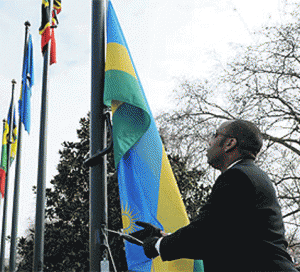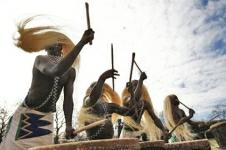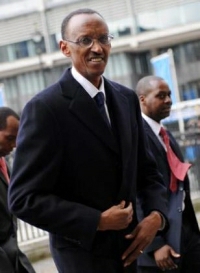Rwanda’s Democratic Credentials Under Fire
In an article published today in independent.co.uk, Daniel Howden of independent.co.uk writes:
Rwanda’s democratic credentials under fire:
Host of UN environment event accused of clamping down on its Green partyPresident Paul Kagame has openly warned his leading rival Victoire Ingabire, leader of the UDF, that she could face prosecution under Rwanda's controversial "genocide ideology" laws
Rwanda’s democratic credentials have been questioned amid evidence that authorities are blocking efforts by the country’s Green Party to contest this year’s elections. The new Greens have been repeatedly thwarted in their attempts to register the party, their meetings have been violently broken up or blocked by police and their leader has had anonymous death threats.
The central African nation has won international praise for its green record and is the host of this year’s UN World Environment Day. “[But] through police harassment and intimidation they are stopping us registering the party which is a legal requirement for taking part in the elections,” said party leader Frank Habineza. The politician, formerly an official with the ruling Rwandan Patriotic Front, has also had a series of death threats, culminating in a recent front page in the newspaper, Umuseso, headlined, “Frank Habineza to be killed in sixty days“. The report which cited anonymous sources claimed security agents would target the politician.
“The government dismisses what is written in Umuseso but then it tends to come true,” said Mr Habineza. “I am scared but I still believe a government should protect its citizens. I am not a criminal; I just have different ideas.”
In February, at a hotel in the capital, Kigali, the party leader was threatened by an individual claiming to speak for security forces. Two attempts to stage a party conference, a first step to registering the Democratic Green Party, have also been stopped by police. Repeated attempts to contact Rwandan authorities for a response to the threats and police actions were unsuccessful.
There are also widespread reports of intimidation and harassment of opposition parties as the country, which has been ruled by the same party for 15 years, gears up for the presidential vote expected in August. Human Rights Watch says all three opposition groups trying to contest the election have faced serious intimidation and bureaucratic blocks.
“The Rwandan government already tightly controls political space,” said Georgette Gagnon, Africa director for the US-based rights group. “These incidents will further undermine democracy by discouraging any meaningful opposition in the elections.”
A day after the February threats against Mr Habineza, a leading member of another opposition group, United Democratic Forces, was beaten by a mob in front of a local government office. The attack appeared to have been well co-ordinated, said HRW. Joseph Ntawangundi said he was attacked by youths who punched him, kicked and scratched him, threw him into the air, and ripped his clothes.
And President Paul Kagame has openly warned his leading rival Victoire Ingabire, leader of the UDF, that she could face prosecution under Rwanda’s controversial “genocide ideology” laws. The legislation is meant to guard against the ethnic divisions that led to the 1994 genocide, but rights lawyers say they have been used to silence critics.
Daniel Howden, Africa Correspondent – independent.co.uk.
March 16, 2010 No Comments
Rwanda Claims Democracy Would Lead To Another Genocide
In his article titled “The politics of genocide in Rwanda”, Geoffrey York reports on the spirit prevailing today at the Rwandan political scene. He writes:
With an election looming in a few months, Rwanda�s authoritarian government has made an astounding claim:democracy leads directly to genocide.
The claim is made in an article this week by Jean Paul Kimonyo, an advisor in the office of Rwandan President Paul Kagame. He argues that Rwanda has only had �plural politics� for two brief periods in its history, and both times it �led to mass killings.�
He also makes the sweeping statement that �political parties and independent media� were a big reason for the killings. All parties and all media, in his view, are just as dangerous as the hate-spewing radio stations and politicians that fuelled the 1994 Rwandan genocide.
His conclusion, apparently, is that Rwanda needs to suppress its political parties, restrict its independent media and tightly control its elections, even though it�s been 16 years since the genocide. Democracy � or �confrontational politics,� as he prefers to call it � would �almost certainly lead to renewed violence.�
This is a very convenient argument for those who are currently in power. But what about everyone else? Opposition political parties are already finding it almost impossible to get registered for the August election. Independent journalists are harassed and threatened.
March 10, 2010 No Comments
Paul Kagame Did Not End The Genocide
So what exactly entails revisionism? And how is it quantifiable when a lot of facts on Rwanda happen to be hearsay.
I am a Rwandan and refuse to be fed by a fabricated truth–no matter how internationally acclaimed it is.
I explain why:
1. The RPF did not start the war to stop genocide. There is no evidence to support this view. Rwanda was relatively a peaceful country albeit a Hutu dictatorship.
2. Kagame did not end the genocide. He won the war. But the killings continued, in Rwanda and beyond. Evidence of RPF’s killings in Kibeho for instance, suggest that Kagame’s interest was always to replace Hutu power by Tutsi power.
3. The war in eastern Congo has largely targeted Hutu refugees and the Hutu Diaspora. Tutsi 1994 heroes like Laurent Nkunda and Bosco Ntaganda have turned out to be the Hitters of Africa.
4. The RPF is extremely PR savvy. It uses psychological tactics and always playing the victim card. For instance, the killings of millions of Congolese are blamed on the unwillingness of the then Zaire to hand over the alleged genocidaires.
5. It is very inaccurate that 1,000,000 Tutsi were killed during the Rwanda genocide. If the Tutsi comprised 10% of the population, it is not difficult to see how suspecting the data is.
6. President Paul Kagame might be a Tutsi liberator (this is arguable) yet, he is seen by many Hutu and Congolese as a mass murder. There is evidence to support these claims.
7. Like any conflict in Africa, there are western interests fueling the conflict. This has been obscured. Rather than blaming the colonialist, let’s focus on the French who funded the Ex-FAR and the Americans/Britons who supported the RPF.
8. The world did not abandon Rwanda. Neither did it fail to intervene. Foreign powers intervened the wrong way, resulting in unexpected calamity.
The people of Rwanda deserve the chance to define their own destiny. They deserve democracy and the world needs to STOP its support of an unpopular dictatorship.
by Mutesi – http://www.theglobeandmail.com/community/?userid=60566512&plckUserId=60566512.
March 10, 2010 No Comments
Rwanda: Rwanda Government Broadcaster ORINFOR To Change Name
Kigali: Government broadcaster ORINFOR will change the name and reform operations within two years � after President Kagame furiously lashed out at the large company � even demanding an apology from its former boss.
Comprising Radio Rwanda, TV Rwanda and two newspapers, the broadcaster will within the same period reform its operations to be more responsive to the needs the taxpayers, according to its acting Director General, Mr. Willy Rukundo.
He said Tuesday that the changes will come with a new name.
[New name disclosed as "Rwanda Broadcasting Network"]
President Paul Kagame has repeatedly complained publicly about the performance of the broadcaster � at some point saying it is either marred in with �incompetence or ineffectiveness �or both�, and demanded an apology from its former Managing Director Mr. Bideri Joseph.
�I can smell something wrong but can�t name it�, Mr. Kagame told journalists last year. �ORINFOR had always had something smelling in it but all have failed to clean it up.�
The company has also been heavily criticized by Parliament which says people in far-rural areas do not understand any government programs because they can only access foreign media. Lawmakers also say the situation has compounded the increasing levels of Genocide revisionism in these areas as communities remained neglected.
ORINFOR is also under fire from the Auditor General of State Finances over its books of accounts. In the latest report for 2008 released last month, the Government Auditor described its finances as �scandalous�.
Despite having a printery, its French and Kinyarwanda newspapers barely get to the streets. Plans to make the Kinyarwanda IMVAHO NSHYA daily seem to have stalled.
TV Rwanda struggles to stay on air with dwindling audiences as more shift to watching satellite TV.
With a $13million government injection, the company is now working on an expansion program. President Kagame suggested that its troubles could be related to the name, demanding that it be renamed.
ORINFOR was established about five decades ago as an agency for government announcements � but has largely remained with the same legacy.
Its former boss Mr. Oscar Kimanuka is battling a corruption and embezzlement sentence.
Announcing changes which have already taken effect, current chief, Mr. Rukundo said Wednesday that a website (http://www.orinfor.gov.rw) is up and running with live radio streaming and TV broadcasts.
ARI-RNA – rnanews.com
March 9, 2010 No Comments
President Kagame Dismisses Commonwealth Critics
London: President Paul Kagame on Monday dismissed criticism that Rwanda does not meet Commonwealth standards on human rights and media freedoms � saying there is �a lot� Rwanda can contribute to the block, RNA reports.
�I think the Commonwealth is a family where there are many failings, and failings don�t come from only one part of that family,� he told a press conference at the Commonwealth Secretariat next to Secretary General Kamalesh Sharma and Trinidad and Tobago PM Patrick Manning.
�Each family has its own failings, but when they come together, then they share good practices to overcome those failings, and that is why Rwanda sees it as very important to be part of the Commonwealth,� said Kagame.

Rwanda�s flag raised at the Commonwealth
The President is in London where he oversaw the rising of Rwanda�s flag at the Secretariat � becoming the 54th. The membership, however, has not come smoothly. The campaign group Commonwealth Human Rights Initiative (CHRI) fiercely opposed Rwanda�s entry arguing that the country needed to clean its house before. The group said the country�s rights record was lacking.
In a statement ahead of the visit, it urged the Commonwealth SG to insist that Kigali �makes every effort to create genuine democratic political atmosphere in the country prior August 2010 elections�.
�We call upon the Commonwealth Secretary General Kamalesh Sharma, in his meetings this week with President Kagame, to urge him to ensure that in these first Rwanda elections as a Commonwealth member, the standards are patently free and fair and in compliance with Commonwealth values,� said Mr. Maja Daruwala, the CHRI director.
For President Kagame, though, there is �a lot we are going to gain from� the British block: �There is also a lot we are going to contribute to the wellbeing of the members of the Commonwealth�.
Mr. Kagame also dismissed claims that media freedoms in Rwanda are lacking - with journalists fleeing the country to neighbouring countries. He said the judicial system handles journalists like other citizens.
�We have had journalists in Rwanda who have killed people in the genocide. It has not spared them that crime because they are journalists, so when they do that they are brought to justice like any other human beings or citizens to be held accountable. We have had journalists who have been involved in other crimes,� he argued.
He rejected the categorization that the media rights situation was worse in Rwanda compared to its neighbours, saying it was a �general problem�.
�However, freedom of expression through the media, the press and so forth is something that goes on, that grows from one situation and develops for the better in the whole region as is the case with Rwanda,� he said.
Indicative of the interest with which Rwanda�s presence at the Commonwealth rises, most of the questions at the press conference were directed at President Kagame.
On embattled Congolese General Laurent Nkunda, in detention here since January last year, President Kagame said Kigali and Kinshasa are making �very good progress.�
The General is trying to challenge his detention in the Supreme Court but even his Canadian lawyer and family are coming to terms with the possibility that the issue can only be dealt with at a political level.
The President said joining the block is an �important milestone in Rwanda�s transformational journey, along which we have already enjoyed the support of many Commonwealth countries�.
Trinidad and Tobago PM, Mr. Manning � also the current chair of the Commonwealth, welcomed President Kagame into the block, describing him as �the newly minted President of Rwanda � newly minted in the context of membership of the Commonwealth � President Kagame.�
Secretary-General Kamalesh Sharma said that from the hard work of the Secretariat, �results were there for everyone to see, particularly the first visit of Honourable President Kagame here�.
In the opening statement, President Kagame set out the plan for Rwanda�s engagement.
�Firstly, the future of all nations depends on their youth, and so I hope that Rwanda can capitalise on the wide range of education and training programmes that the Commonwealth provides.
�Secondly, we hope to tap into the trade and investment opportunities that the Commonwealth offers so that Rwanda can expand its economy and effectively participate in the global marketplace.
�At the same time we believe in mutual learning and Rwanda wishes to play its role in exchanging lessons both from our recent past but also from our traditions and culture.
�Rwanda is committed to the values of the Commonwealth and will contribute to strengthening the organisation, furthering our mutual development agendas and working in close partnership with other members to promote prosperity, freedom and rights for all.�
ARI-RNA – rnanews.com
March 9, 2010 No Comments
Rwanda Formally Welcomed Into Commonwealth

Rwandan dance troupe celebrates in London
Rwandan President Paul Kagame joined celebrations in England as Rwanda was formally welcomed into the Commonwealth Club of Nations.
Rwandan performers opened the Commonwealth Day ceremony with a traditional dance and Rwandan President Paul Kagame addressed the media. “I am pleased to be here on this special [day] as my country, Rwanda, is formerly welcomed into the Commonwealth,” he said.
Rwanda was admitted to the Commonwealth in November 2009, during the biennial Commonwealth Heads of Government Meeting in Trinidad and Tobago.
Mr. Kagame says he wants Rwanda’s youth to benefit from Commonwealth educational and training programs, and hopes his country will gain financially by being a member. “We hope to tap into the trade and investment opportunities that the Commonwealth offers, so that Rwanda can expand its economy and effectively participate in the global marketplace,” he said.
The Commonwealth of Nations is an intergovernmental organization of 54 independent member states. All but two, Mozambique and Rwanda, had a British colonial past or constitutional link to Britain.
Rwanda’s bid to join the Commonwealth began in 2003.
In March the Commonwealth Human Rights Initiative voiced concern over human rights and freedom of expression in Rwanda and said it was deeply concerned at the level of threats to opposition parties before presidential elections set to take place in August. But Rwandan officials said at the time the allegations were without basis.
Mr. Kagame said Rwandan rights will gain from being part of the international organization. “I think the Commonwealth is a family where there are many failings, and failings do not come from only one part of that family. Each family has its own failings, but when they come together then they share good practices to overcome those failings and that is why Rwanda sees it as very important to be part of the Commonwealth. There is a lot we are going to gain from it, there is also a lot we are going to contribute to the well being of the Commonwealth,” he said.
After speaking with reporters, Mr. Kagame witnessed the hoisting ceremony of the Rwandan flag.
Rwandans sang on the grassy lawn of the Commonwealth Secretariat in London as the flag was raised.
Trinidad and Tobago Prime Minister Patrick Manning, who is Commonwealth chairman, and Commonwealth Secretary General Kamalesh Sharma also witnessed the ceremony.
Outside the ceremony, Britain-based Rwandans gathered to mark the occasion.
Many were singing in celebration. Claude Rutsinzi said he thought Mr. Kagame had done much to improve human rights in his country. “I do not accept at this stage really that the human-rights situation in Rwanda is bad, compared even to many many other countries in the Commonwealth,” he said.
But others, like Ambrose Nzeyimana, said they did not think Rwanda should be eligible yet to join the Commonwealth.
“We are not against Rwanda being part of the Commonwealth, but we are afraid that the regime of Paul Kagame cannot stand the democracy that the Commonwealth is expecting from its members,” Nzeyimana said.
Mr. Kagame was also to join Queen Elizabeth for a multi-faith Observance in London.
Voice of America – voanews.com.
March 9, 2010 No Comments

